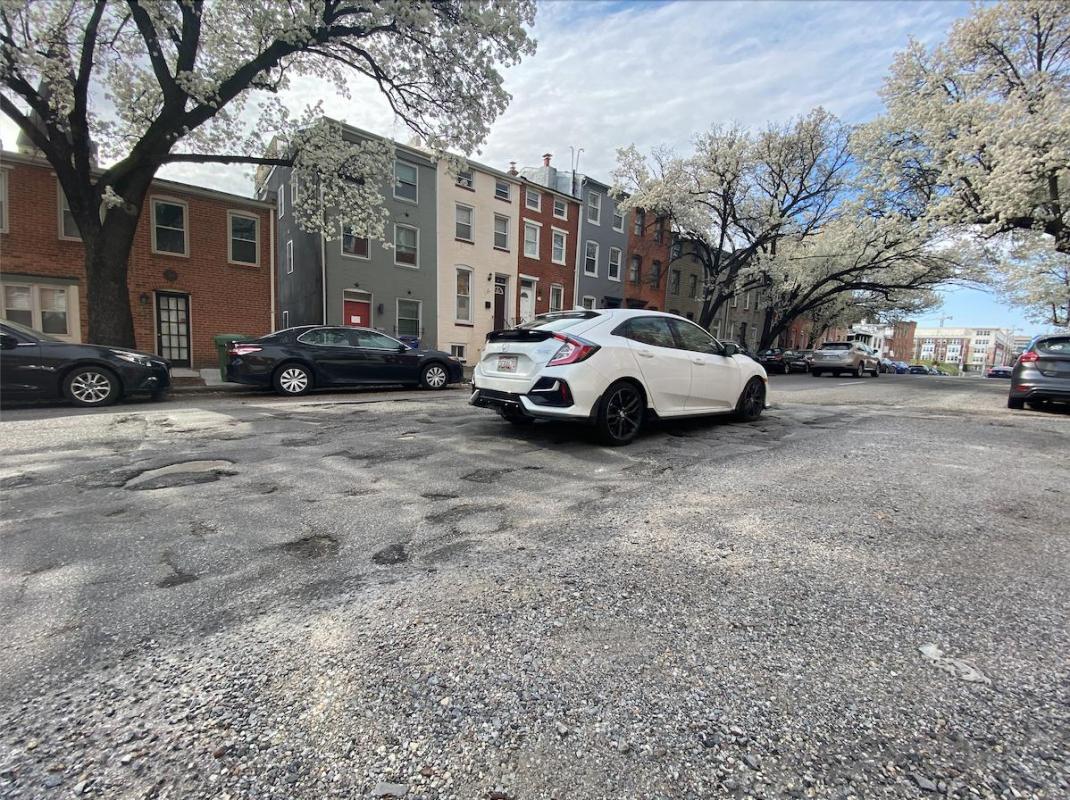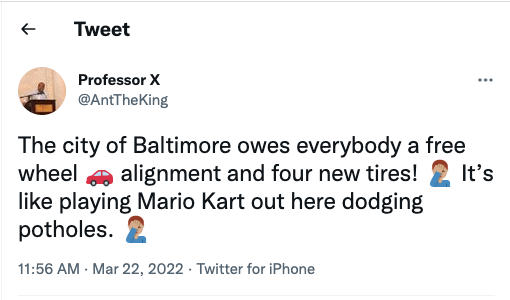
The lowly pothole is a potent unifier in politics. People of all stripes want it fixed, pronto, and mustering the will and the money to do so is considered a non-partisan no-brainer. Yet pols across Maryland have seen their pothole-filling efforts stymied over the past dozen-plus years, since the main source of funding they’d long relied upon—state Highway User Revenues (HUR), the local share of fuel and vehicle taxes earmarked for repairing roads and bridges—was severely cut during the budgetary belt-tightening prompted by the Great Recession that started in 2008.
This being an election year, with a record $7.5 billion state-budget surplus to boot, it is perhaps not surprising that the General Assembly finally is poised to reopen the road-repair spigot. By how much remains to be seen, however.
Baltimore has been most affected by the annual shortfall. The city is Maryland’s only jurisdiction that shoulders the full burden of paying to maintain all of its roads and bridges. Literally every other jurisdiction has at least some of its roads maintained by the State Highway Administration (SHA).
Since the cuts were made under then-Gov. Martin O’Malley, “the cumulative loss for our Highway User Revenues is $900 million,” Baltimore mayor Brandon Scott on March 10 told the House Environment and Transportation Committee, where much of the wrangling over the issue has been taking place. “That,” he continued, “is leading to crumbling roads, unfilled potholes, unsafe bridges.”
The results of this nearly $1-billion shortfall are felt everyday by Baltimore road users. Just search “Baltimore pothole” on Twitter for snarky commentary about the pounding on local vehicles by city drivers. On March 27, @lovee_kior made the mock claim that “Baltimore potholes will change yo radio, unlock yo doors & roll yo windows down!”
Meanwhile, @AntTheKing on March 22 claimed half-jokingly that “the city of Baltimore owes everybody a free wheel alignment and four new tires! It’s like playing Mario Kart out here dodging potholes.” And on March 5, @the_megalopolis reminded folks that roads are not just for drivers by making the thought-provoking case that “if you care about fixing potholes in Baltimore City you should be encouraging as many people to ride bicycles as possible, because it’s the cars that cause potholes in the first place!”

Summarizing the state of play for the legislative fix is Baltimore City Department of Transportation spokesperson Kathy Dominick, who explains that passing it is critical, since it will help the city leverage newly available federal funds. Upping the HUR ante will help fill “the need for local matching funds to tap federal infrastructure dollars” now available due to passage of the Infrastructure Investment and Jobs Act, Dominick writes in an email. The original version of the HUR bill in Annapolis, she continues, “would gradually increase the city’s allocation of HUR from 8.5% in fiscal year 2024 to 12.1% in 2028 and the years that follow.” The bill was amended, though, and in its current form “stops the increase after fiscal year 2027 and reverts back to 7.7% for Baltimore City in fiscal year 2028.” The city, she explains, “supports the bill as introduced and not as amended.”
Many rural Republicans in the General Assembly, whose districts’ roads are suffering wherever they’re not maintained by SHA, are also supporting more HUR-backed road-repair funding. State Del. Jefferson Ghrist, a Republican who represents counties on the upper Eastern Shore, captured the thoughts of many of his colleagues when he said on the floor of the General Assembly in March that “we have a responsibility to provide this critical infrastructure, to pave these roads, and every day that we don’t fund this, we’re falling farther and farther behind in deferred maintenance.”
During committee deliberations on the bill, state Del. Jerry Clark (R-Calvert and St. Mary’s counties) suggested that, given the fact that the state currently enjoys a substantial surplus, “why not for the next couple, three years, while we got the funds, give these counties and municipalities the money they need to get these roads back to where they need to be?”
Baltimore City state Del. Brooke Lierman (D-46th District), who is running for state Comptroller this year, had a short and sweet answer for Clark: “The governor could have allocated that in the budget,” she said, “but he didn’t.” So, it remains up to the legislature to craft a bipartisan solution to this very bipartisan problem.
